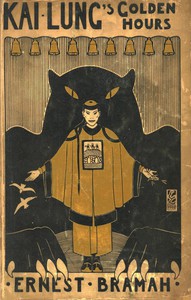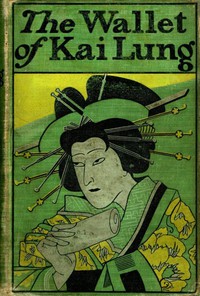Kai Lung's Golden Hours by Ernest Bramah (books to read for 12 year olds TXT) 📗

- Author: Ernest Bramah
Book online «Kai Lung's Golden Hours by Ernest Bramah (books to read for 12 year olds TXT) 📗». Author Ernest Bramah
“It is sufficient to have lived so long,” said Ten-teh. Then perceiving that it was evening, for the jade and crystal lamps were lighted, he cried out: “The time has leapt unnoted. How many are by this hour upon the march?”
“Sixscore companies of a hundred spearmen each,” said Kwo Kam. “By dawn four times that number will be on their way. In less than three days a like force will be disposed about the passes of the Han-sing mountains and the river fords, while at the same time the guards from less important towns will have been withdrawn to take their place upon the city walls.”
“Such words are more melodious than the sound of many marble lutes,” said Ten-teh, sinking back as though in repose. “Now is mine that peace spoken of by the philosopher Chi-chey as the greatest: ‘The eye closing upon its accomplished work.’”
“Assuredly do you stand in need of the healing sleep of nature,” said the Emperor, not grasping the inner significance of the words. “Now that you are somewhat rested, esteemed sire, suffer this one to show you the various apartments of the palace so that you may select for your own such as most pleasingly attract your notice.”
“Yet a little longer,” entreated Ten-teh. “A little longer by your side and listening to your voice alone, if it may be permitted, O sublime one.”
“It is for my father to command,” replied Kwo Kam. “Perchance they of the eleven villages sent some special message of gratifying loyalty which you would relate without delay?”
“They slept, omnipotence, or without doubt it would be so,” replied Ten-teh.
“Truly,” agreed the Emperor. “It was night when you set forth, my father?”
“The shadows had fallen deeply upon the Upper Seng Valley,” said Ten-teh evasively.
“The Keeper of the Imperial Stores has frequently conveyed to us their expressions of unfeigned gratitude for the bounty by which we have sought to keep alive the memory of their hospitality and our own indebtedness,” said the Emperor.
“The sympathetic person cannot have overstated their words,” replied Ten-teh falteringly. “Never, as their own utterances bear testimony, never was food more welcome, fuel more eagerly sought for, and clothing more necessary than in the years of the most recent past.”
“The assurance is as dew upon the drooping lotus,” said Kwo Kam, with a lightening countenance. “To maintain the people in an unshaken prosperity, to frown heavily upon extortion and to establish justice throughout the land—these have been the achievements of the years of peace. Yet often, O my father, this one’s mind has turned yearningly to the happier absence of strife and the simple abundance which you and they of the valley know.”
“The deities ordain and the balance weighs; your reward will be the greater,” replied Ten-teh. Already he spoke with difficulty, and his eyes were fast closing, but he held himself rigidly, well knowing that his spirit must still obey his will.
“Do you not crave now to partake of food and wine?” inquired the Emperor, with tender solicitude. “A feast has long been prepared of the choicest dishes in your honour. Consider well the fatigue through which you have passed.”
“It has faded,” replied Ten-teh, in a voice scarcely above a whisper, “the earthly body has ceased to sway the mind. A little longer, restored one; a very brief span of time.”
“Your words are my breath, my father,” said the Emperor, deferentially. “Yet there is one matter which we had reserved for affectionate censure. It would have spared the feet of one who is foremost in our concern if you had been content to send the warning by one of the slaves whose acceptance we craved last year, while you followed more leisurely by the chariot and the eight white horses which we deemed suited to your use.”
Ten-teh was no longer able to express himself in words, but at this indication of the Emperor’s unceasing thought a great happiness shone on his face. “What remains?” must reasonably have been his reflection; “or who shall leave the shade of the fruitful palm-tree to search for raisins?” Therefore having reached so supreme an eminence that there was nothing human above, he relaxed the effort by which he had so long sustained himself, and suffering his spirit to pass unchecked, he at once fell back lifeless among the cushions of the throne.
That all who should come after might learn by his example, the history of Ten-teh was inscribed upon eighteen tablets of jade, carved patiently and with graceful skill by the most expert stone-cutters of the age. A triumphal arch of seven heights was also erected outside the city and called by his name, but the efforts of story-tellers and poets will keep alive the memory of Ten-teh even when these imperishable monuments shall have long fallen from their destined use.
When Kai Lung had completed the story of the loyalty of Ten-teh and had pointed out the forgotten splendour of the crumbling arch, the coolness of the evening tempted them to resume their way. Moving without discomfort to themselves before nightfall they reached a small but seemly cottage conveniently placed upon the mountain-side. At the gate stood an aged person whose dignified appearance was greatly added to by his long white moustaches. These possessions he pointed out to Hwa-mei with inoffensive pride as he welcomed the two who stood before him.
“Venerated father,” explained Kai Lung dutifully, “this is she who has been destined from the beginning of time to raise up a hundred sons to keep your line extant.”
“In that case,” remarked the patriarch, “your troubles are only just beginning. As for me, since all that is now arranged, I can see about my own departure—‘Whatever height the tree, its leaves return to the earth at last.’”
“It is thus at evening-time—to-morrow the light will again shine forth,” whispered Kai Lung. “Alas, radiance, that you who have dwelt about a palace should be brought to so mean a hut!”
“If it is small, your presence will pervade it; in a palace there are many empty rooms,” replied Hwa-mei, with a reassuring glance. “I enter to prepare our evening rice.”





Comments (0)